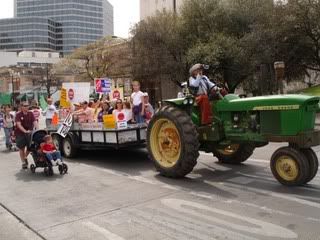
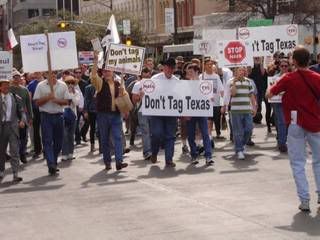
Supporters of the TTC and NAIS appear to be concentrated in urban center. Regional Councils of Government Transportation Committees (RTCs) are the most ardent supporters of the TTC and other proposed private public partnership toll road construction and /or operation contracts. In attempting to get a short term solution for scarce transportation funding for local and regional projects, many city councils and county governments have signed on to the "Toll them as much as you can for as long as you can" schemes which will cost motorists (and consumers) more to travel and ship goods along most of the states future roads and road expansion projects.
It could appear to be a rural vs. city issue, but it is not. It is really a power grab through TxDot by some local elected politicians to transfer "upfront" money to unelected appointed Regional Transportation Committees. Combined with implementation of the mandatory National Animal Identification System in Texas, it will result in surges of inflation which will threaten the economic welfare of every person and business in Texas.
They sold this scheme with a carrot of "up front money" dangled to local governmental officials through RTCs. No one examined the payload of hidden costs, detrimental financial impact or short term/long term inflation. TxDot and RTCs have downplayed the significant difference in the cost for funding road projects with private for profit companies instead of using public money, indexing the gas tax and applying designated funding to transportation.
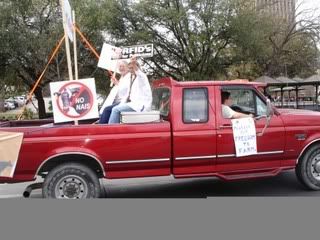
This series of journals discusses two issues which are linked. They are linked because they are both schemes which will transfer money and financial opportunities from many for the benefit of a few for terms of at least 50 years. Through proposed exercise of eminent domain, more acreage will move from private ownership to State ownership to be controlled for the financial benefit of private concessionaires (Cintra and Zachry). NAIS hits the farmers and ranchers hardest economically. However its impact reverberates throughout the economy and will fuel inflation which will take "buying power for the same dollar" out of the pockets of every business, man, woman and child in Texas. It will impact every consumer of goods produced and or marketed from Texas -- irregardless of where they live.
Construction of the Trans Texas Corridor and expansion and construction of other new highways using the private public partnership models of the TTC and Texas State Highway 121 will take money out of the pockets of every consumer who purchases goods that originate in Texas or are shipped through Texas.
I'll start out by discussing the cost of tuna fish. Most folks are familiar with buying tuna fish in the grocery store on sale. Last year we could usually find it on sale at 3 cans for a dollar. This year on sale it is more frequently offered as 10 cans for $10. Last year it was 33 cents can – this year it is a dollar a can. That is a 200% increase in one year for a commonly purchased food product. Rich and poor alike buy groceries. They are basic necessities. We could have used hamburger meat instead of tuna fish for this example but I chose tuna. The cost of tuna rose, not because of increase manufacturing cost or a significant shift in supply or demand for tuna. It rose last year because of increased gasoline costs for shipping. Shipping costs are usually passed on 100% to the consumer. Inflated fuel costs results in inflation when we go to the checkout counter in the grocery store.
Implementing the private public toll road partnership for building Texas Highways as toll roads will have a very similar impact on the price of goods when we are standing at the check out counter. When we buy hammers or nails, when we buy feed, when we buy tuna fish, when we buy clothes, when we buy medication, we'll pay higher prices to cover the merchants’ increases in shipping costs for the goods. When we buy meat we’ll pay for the increase in shipping for the feed and supplies to feed the beef plus increases in shipping costs to the slaughter houses and then to the market. If the TTC or another toll road is cut through a ranch or farm, that will be the route to market. They’ll have to pay to use the road that cuts through land they used to own!
Proponents of the private/public transportation partnership argue that those who choose to drive on the roads will be the ones to pay the tolls. However, all of us, no matter where we live and even if we never drive or ride down the toll road, we’ll pay for it. When we check out at the grocery store, part of our grocery bill will cover profit for the private company operating toll roads and for “up front money” for local politicians to control and divide up as “pork”. It will be a very poorly hidden regressive tax which will fuel inflation and force us to make tough personal financial decisions. State and local elected officials have ducked out and avoided facing the tough budgetary issues head-on. These private/public partnerships are appealing to them on the surface but will deliver a financial payload that will be devastating to local citizens, businesses and government alike.
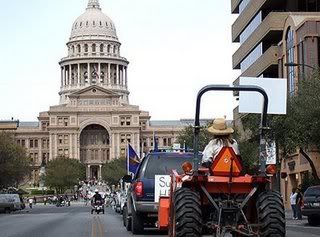
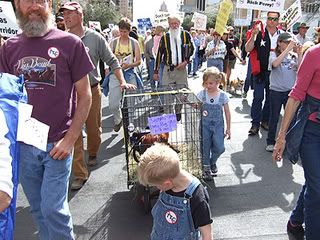
One of the cruelest aspects of the Cintra/SH121 contract (which is the first of many TxDot plans to sign in the near future all over Texas) is that children (including two generations who are not even born yet) will be paying the highest tolls and related shipping fees for goods and services under the escalating toll private public partnership agreements.
There will be some increase to pay for road maintenance and construction no matter what policies are implemented. However, the private/public partnership toll road schemes devised to generate as much "excess toll revenue" so that private partners can make profit while distributing substantial sums as "up front money" to regional transportation committees will help accelerate the rise in inflation. It is probable, that coupled with implementation of NAIS and continuing high energy costs, we'll return to the nightmare days of double-digit inflation. It is quite possible that we'll be seeing escalating inflation while salaries and real income stays flat or drops off. To control inflation we usually see interest rates on loans, and home mortgages rise. Folk make only the same or less money but have to spend more for a can of tuna, for clothes, people have to pay higher house payments for the same house when inflation rises. Folks pay more to finance automobiles. These are issues which are of paramount importance to every city dweller and every business person.
The farmers and ranchers are leading the charge in Texas in opposition to NAIS and TTC. We all must join in.
There are many cost in implementation of NAIS. We'll discuss them further in the comments section and in journals later this week. Please pass links to this journal along to your friends and ask them to join in the conversation. The more that recommend and comment on this series, the more visibility we can give this issue.
Crossposted on Texas Koas, Daily Kos and Diatribune.
Photos used by permission, courtesy of Sal Costello, Judith McGeary, Pam Thompson, Tatum Evans and Tom Blackwell.

No comments:
Post a Comment